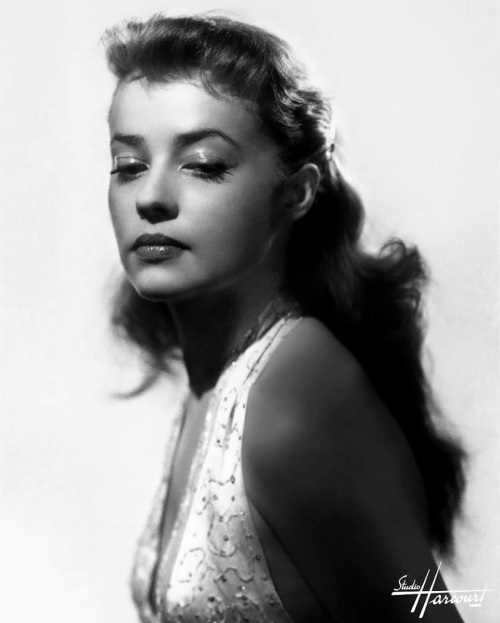Tags
actress, Ascenseur pour l'échafaud, Dan Budnick, François Truffaut, France, French cinema, Jeanne Moreau, Jules et Jim, Le Tourbillon, Les Amants, Louis Malle, Miles Davis, Nouvelle Vague, Olivier Roller, Phil Johnson, Serge Rezvani, Studio Harcourt

Jeanne Moreau (23 January 1928 — 31 July 2017) in a portrait by Studio Harcourt Paris, 1950s
One of France’s most famous and beloved actresses, Jeanne Moreau, has died at the age of 89. In a career spanning 70 years, she has starred in more than 130 films.
Born in Paris in 1928 to an English mother and a French father, Jeanne Moreau made her acting debut on stage, at the 1947 theatre festival of Avignon, France. Although she was succesful in theatre, it took a while for her film career to take off – in an era dominated by cinematic sex kittens like Marilyn Monroe, Brigitte Bardot and Gina Lollobrigida, many film directors didn’t think Moreau was ‘photogenic’ enough…

Still from Louis Malle’s psychological thriller film Ascenseur pour l’échafaud (France, 1958)
French film director Louis Malle, however, considered her an enormous talent and cast her for the leading female part in his 1958 film Ascenseur pour l’échafaud, (released in the UK as Lift to the Scaffold, and in the USA as both Elevator to the Gallows and Frantic). The psychological thriller, a true masterpiece, features a melancholy, and equally legendary score by American jazz trumpeter Miles Davis.

Jeanne with Miles Davis, Paris, 1957 | Keystone / Getty
After about 17 somewhat uneventful movies featuring Jeanne in beautiful make-up and flattering lighting, it was this film — in which Louis Malle lit her with little more than appartment, hallway and elevator lamps, street lanterns and lights from shops and bars she passes and enters — that instantly turned her into an icon of French Nouvelle Vague (‘New Wave’) cinema, and a film legend in her own time.
In the clip below she can be seen in one of the most famous scenes of Ascenseur pour l’échafaud, all forlorn, walking the streets of Paris to music by Miles Davis and his quintet. Davis and his band improvised and recorded the entire score in a matter of hours while watching scenes from the movie. In a 2004 review of this groundbreaking musical soundtrack, jazz critic Phil Johnson wrote in British newspaper The Independent on Sunday:
The loneliest trumpet sound you will ever hear, and the model for sad-core music ever since. Hear it and weep.
Jeanne’s newly acquired iconic status was cemented a mere eight months later, when she starred as a wealthy but unhappy housewife who gets caught up in an adulterous affair in Louis Malle’s drama film Les Amants (‘The Lovers’). The movie was controversial for a love scene in which nothing can be seen, yet everything can be heard, but the controversy did not prevent the jury of the 1958 Venice Film Festival from awarding Jeanne Moreau the prize for best actress.
Ms. Moreau’s biggest international success was achieved with director François Truffaut’s 1962 film Jules et Jim, another Nouvelle Vague classic, in which Moreau famously sings the song Le Tourbillon (‘The Whirlwind’), written by Serge Rezvani, one of her co-stars in the movie (see clip below).
For her work in film and on stage, Jeanne Moreau has received numerous awards, among which a Best Actress Award and an honorary Palme d’Or, both at the Cannes Film Festival, three Césars (‘the French Oscar’), two Bafta awards (UK), and a lifetime achievement Oscar (USA). Her life revolved around acting, and she continued working well into old age, stating in an interview: ‘I’ll stop when I’m dead.’

Photo: Dan Budnick, Vogue, 1962
Jeanne Moreau, of course, will never stop, as she will never really die. The courageous actress, who was not afraid to do away with the securities of beauty and vanity, showed the film world, and the world in general, that there’s true beauty to be found in truthfulness and, most of all, in fearlessness. Her bravery, coupled with her talent for making us feel and accept our own emotions, has rendered her immortal.
Adieu, Jeanne – bonjour, beauté eternelle. (‘Farewell, Jeanne – hello, eternal beauty.’)
Tasio Ferrand © 31 July 2017

Photo: Olivier Roller, circa 2007
